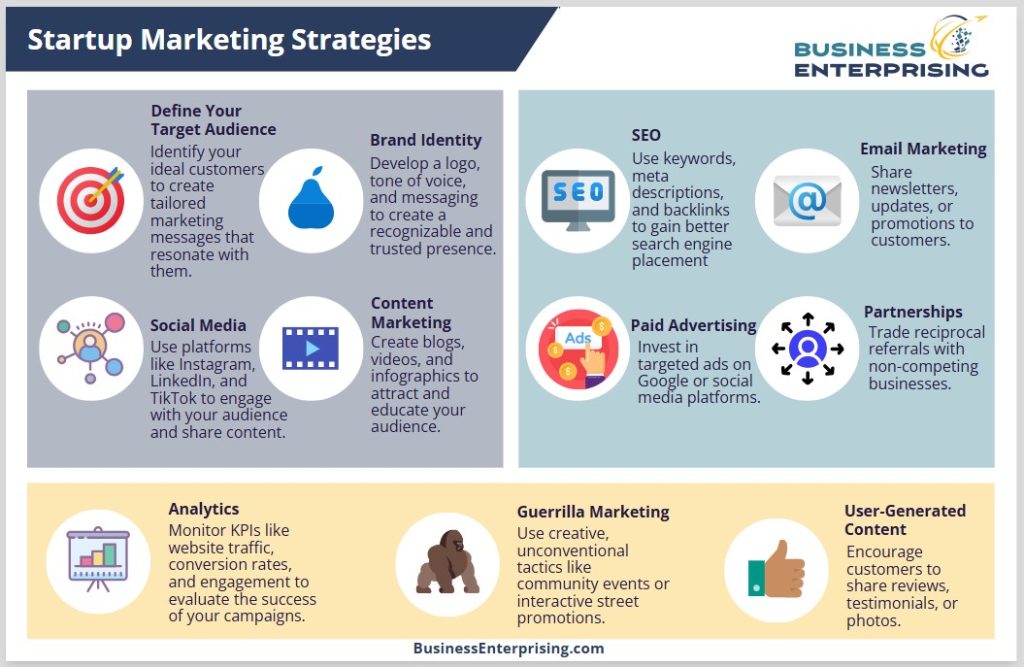 Understanding startup marketing basics is essential for growing your business and reaching your audience effectively. A solid marketing strategy helps you connect with customers, build your brand, and drive growth. However, creating a plan that aligns with your goals and budget can be challenging. By focusing on key elements like audience targeting, branding, and analytics, you can set a strong foundation.
Understanding startup marketing basics is essential for growing your business and reaching your audience effectively. A solid marketing strategy helps you connect with customers, build your brand, and drive growth. However, creating a plan that aligns with your goals and budget can be challenging. By focusing on key elements like audience targeting, branding, and analytics, you can set a strong foundation.
Additionally, leveraging social media and low-cost tactics allows you to maximize your resources and engage your audience creatively. Tracking metrics ensures that your efforts are delivering results and highlights areas for improvement. These steps are not just practical but also critical for navigating the competitive startup environment.
Startup marketing basics provide the tools you need to succeed in a crowded market. With a thoughtful approach and consistent effort, you can achieve meaningful growth and long-term success.
Defining Your Target Audience
Defining your target audience is one of the most important steps in startup marketing basics. Knowing who your ideal customers are helps you focus your marketing efforts and resources effectively. However, identifying this audience requires research and analysis to understand their needs, preferences, and behaviors.
Start by gathering demographic information, such as age, location, and income levels. Additionally, consider psychographic factors like interests, values, and lifestyle choices. Tools like surveys, customer interviews, and analytics platforms can provide valuable insights. By combining these data points, you can create a clear profile of your target audience.
Understanding your audience also involves knowing where they spend their time. For example, younger customers might be active on Instagram or TikTok, while professionals may prefer LinkedIn. Therefore, aligning your marketing channels with their preferences increases the chances of engagement. Additionally, testing different platforms allows you to refine your approach.
Defining your audience not only guides your campaigns but also helps you craft messages that resonate. Tailored content speaks directly to their needs and builds trust in your brand. By prioritizing this step in startup marketing basics, you lay a solid foundation for creating campaigns that deliver results.
Building a Strong Brand Identity
Building a strong brand identity is a key element of startup marketing basics. Your brand is how customers recognize and connect with you. A clear and consistent identity helps you stand out in a competitive market. Additionally, it builds trust and loyalty among your audience.
Logo design plays an important role in creating a recognizable brand. A simple, memorable logo makes your business instantly identifiable. However, your brand identity extends beyond visuals. Consistent messaging and tone of voice are equally important. Whether formal or conversational, your tone should reflect your company’s personality and values.
Maintaining consistency across all platforms strengthens your brand. For example, your website, social media, and marketing materials should share the same colors, fonts, and messages. Additionally, regularly reviewing your content ensures alignment with your overall brand goals. This approach helps reinforce your identity and keeps your audience engaged.
By focusing on these elements, you can create a cohesive and impactful brand. A strong identity not only supports your marketing efforts but also leaves a lasting impression. As part of startup marketing basics, this step sets the stage for long-term success.
Creating a Cost-Effective Marketing Plan
Creating a cost-effective marketing plan is a core element of startup marketing basics. A well-thought-out strategy helps you achieve your goals without overspending. However, balancing your budget while maximizing results requires careful planning and prioritization. By focusing on targeted efforts, you can make the most of your resources.
Start by defining your goals clearly. Whether you want to increase brand awareness or drive sales, your objectives should guide your decisions. Additionally, consider your audience’s preferences and where they are most active. Aligning your marketing efforts with their habits ensures better engagement and reduces wasted spending.
Leverage free or low-cost tools to stretch your budget further. For example, use social media platforms to connect with your audience and share content. Additionally, creating engaging blogs or videos can attract attention without significant upfront costs. These strategies allow you to build a strong online presence while staying within your limits.
Tracking your results is essential for refining your plan over time. Monitor key metrics like website traffic or conversion rates to see what works. Additionally, focus on adjusting your efforts to emphasize the most effective tactics. This data-driven approach ensures your marketing plan evolves with your needs.
By aligning your strategy with your goals and resources, you can create a marketing plan that delivers results. As part of startup marketing basics, this approach helps you grow efficiently and build a solid foundation for future success.
Leveraging Social Media for Growth
Leveraging social media for growth is an essential part of startup marketing basics. Social platforms provide a cost-effective way to reach your audience. However, to see results, you need a clear strategy tailored to each platform. Focusing on engagement helps you build connections and grow your brand effectively.
Instagram is ideal for showcasing visually appealing content. High-quality photos, short videos, and stories can highlight your products or services. Additionally, using hashtags and collaborating with influencers can boost your visibility. Posting consistently and responding to comments also fosters a strong connection with your audience.
LinkedIn works well for connecting with professionals and building your network. Sharing thought leadership articles, industry updates, or company achievements positions your startup as knowledgeable and reliable. Additionally, joining groups and engaging in discussions helps expand your reach and attract potential clients or partners.
TikTok offers unique opportunities to create viral content and connect with younger audiences. Short, creative videos that align with current trends can quickly capture attention. Additionally, using challenges, collaborations, or relatable humor increases the chances of engagement and growth.
By aligning your approach with each platform’s strengths, you can maximize your social media efforts. Consistent engagement and relevant content are key to building your brand’s presence. Incorporating social media into your startup marketing basics ensures that you connect with your audience and support long-term growth.
Measuring Success with Analytics
Measuring success with analytics is a fundamental aspect of startup marketing basics. Tracking key performance indicators (KPIs) provides valuable insights into your campaigns. However, focusing on the right metrics ensures you make informed decisions to improve your strategy and maximize your efforts.
Website traffic is a key metric that shows how well your content attracts visitors. Analyzing sources of traffic, such as organic search, social media, or referrals, helps you understand what works best. Additionally, reviewing metrics like bounce rates and session duration can highlight areas for improvement on your website.
Conversion rates measure how many visitors take desired actions, such as signing up or making a purchase. Tracking this metric helps you evaluate the effectiveness of your calls-to-action and landing pages. Therefore, testing and refining your approach can lead to better results over time.
Customer engagement metrics, like social media interactions or email open rates, indicate how well your audience connects with your content. Monitoring these KPIs helps you identify trends and preferences. Additionally, regular analysis ensures your messaging remains relevant and impactful.
By leveraging analytics, you gain a clear picture of what drives success and where to adjust your strategy. These insights are essential to refining your startup marketing basics, ensuring continuous improvement, and achieving your business goals effectively.
Exploring Low-Cost Marketing Tactics
Exploring low-cost marketing tactics is an essential part of startup marketing basics. These strategies allow you to promote your business effectively without overspending. By focusing on creativity and community engagement, you can achieve significant results while keeping expenses low.
Guerrilla marketing offers an exciting way to generate buzz. Tactics like sidewalk chalk art, creative stickers, or flash mobs create memorable experiences for your audience. Additionally, these efforts rely on attention-grabbing ideas rather than expensive campaigns, making them ideal for startups.
Partnerships with other businesses can also boost your visibility. Collaborating with complementary brands allows you to share audiences and resources. For example, co-hosting events or cross-promoting on social media benefits both parties. Additionally, partnerships build credibility by associating your startup with established businesses.
Content creation is another low-cost strategy that provides lasting value. Writing blogs, producing videos, or creating social media posts can engage your audience and showcase your expertise. Repurposing content across multiple platforms maximizes your reach without requiring extra effort. Additionally, this approach helps establish your startup as a trusted voice in your industry.
By combining these tactics, you can create a strong marketing presence without straining your budget. Low-cost strategies are an important part of startup marketing basics, helping you grow efficiently and connect with your audience.
Conclusion
Mastering startup marketing basics is essential for building a strong foundation and achieving sustainable growth. By defining your target audience, creating a consistent brand, and using cost-effective strategies, you can connect with customers effectively. Additionally, leveraging social media and tracking analytics helps refine your approach and improve results over time.
However, successful marketing requires flexibility and ongoing effort. Regularly evaluating your strategies and experimenting with new ideas ensures you stay competitive. Additionally, focusing on creative, low-cost tactics allows you to maximize your resources and expand your reach.
By implementing these principles, you can establish a strong presence in your market. Startup marketing basics provide the tools you need to grow efficiently and build lasting relationships with your audience.



